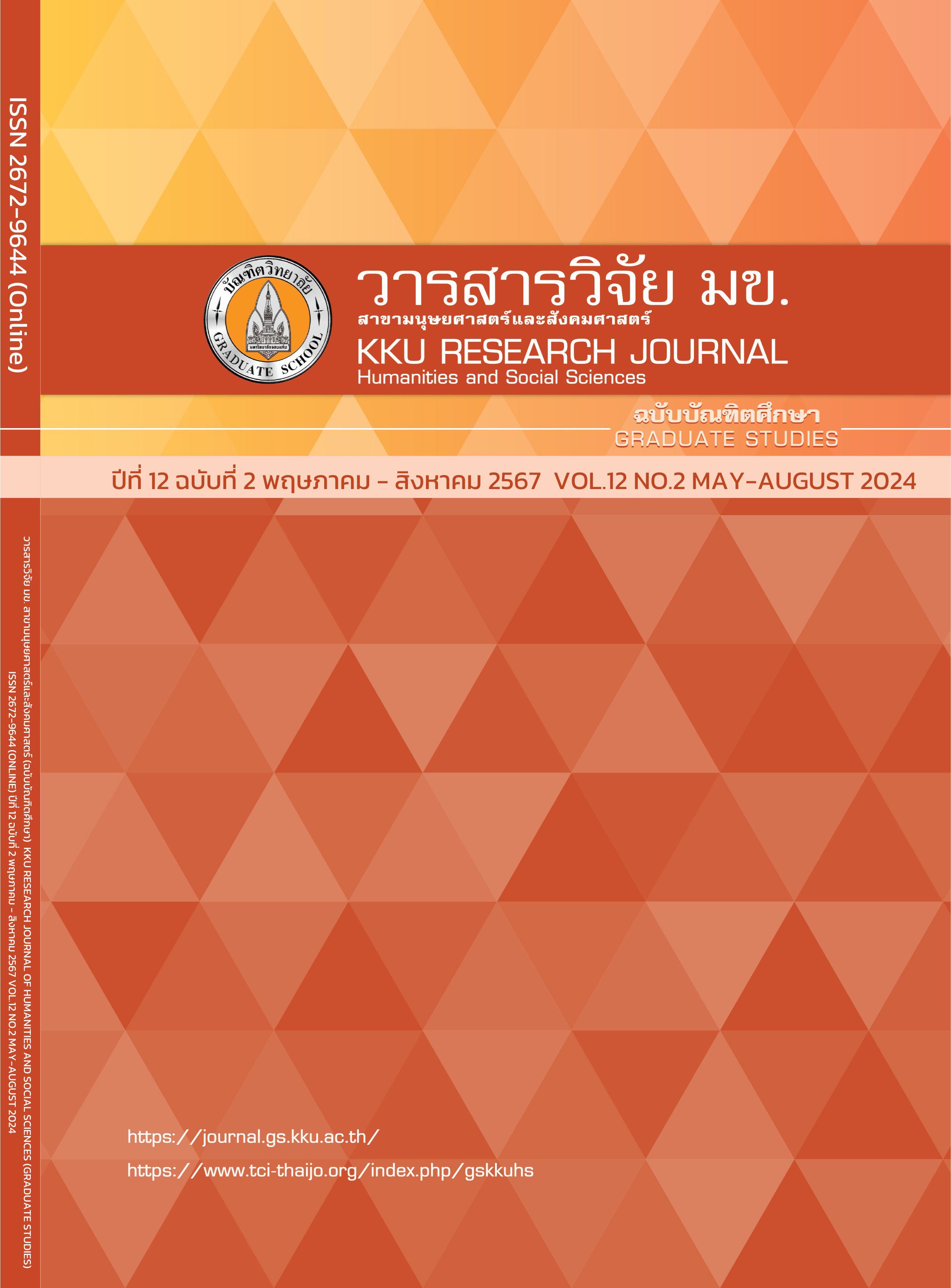Blended Supervision Approach for Teachers Proactive Learning Management under Schools of Secondary Educational Service Area Office Nongkhai
Keywords:
Internal supervision, Active learning, Blended supervision approachAbstract
This research aims to: 1) study the current conditions, desirable conditions, and necessary needs for blended internal supervision approaches for teachers' active learning management, and 2) explore blended internal supervision approaches for teachers' active learning management. The study employs a mixed-methods approach divided into two phases. Phase 1 involves quantitative research with a population of 1,196 school administrators and teachers, from which a sample of 290 participants from the Secondary Educational Service Area Office Nong Khai was obtained through stratified random sampling. Data was collected using questionnaires and analyzed using basic statistics, including mean, standard deviation, and priority needs assessment using the Modified Priority Needs Index (PNIModified). Phase 2 consists of qualitative research, involving interviews with five key informants: one policy-level administrator, three school administrators, and one teacher. The qualitative data was analyzed using content analysis. The research findings show that the current state and desirable conditions of blended internal supervision are at the highest level overall. The current state of internal supervision planning has the highest average score, with both face-to-face and online supervision methods being used. Regarding needs, the improvement and development aspect has the lowest average score, indicating a need to enhance the efficiency of the supervision process. Additionally, there is a demand for strengthening teachers' knowledge and skills before supervision, as well as an increased need for using technology and innovation in learning management. The guidelines for blended internal supervision for teachers' active learning management consist of 7 main components: 1) Creating a participatory atmosphere 2) Designing learning activities 3) Using blended supervision methods 4) Utilizing media, innovation, and technology 5) Measurement and evaluation 6) Enhancing knowledge before supervision 7) Evaluating supervision results. The assessment of the appropriateness and feasibility of these guidelines by experts found that all components were rated at the highest level for both appropriateness and feasibility.
References
Office of the Basic Education Commission. (2021). Report on the Evaluation of Teacher Knowledge and Competency Development Project, Academic Year 2020. Bangkok: Office of the Basic Education Commission. Thai.
Somuthai S. “Educational Supervision” an assistance to develop of learning management competencies in 21st century. J Res Acad. 2022; 5(3): 275–87.
Sukawan A, Chumnasaiw C, Kotakam S, Saiysing J, Chaikhirin A, Kongpet Y, et al. The development
of internal school supervision leadership with Pidre supervision process and active learning observation techniques in classrooms to implement supervisors’ thinking reflection coaching competencies. J Mod Learn Dev. 2024; 9(2): 379–94. Available from: https://so06.tci-thaijo.org/index.php/jomld/article/view/270403.
Kampol K. Development of internal supervision model using reflective coaching techniques in secondary schools under the Office of the Basic Education Commission. [PhD thesis]. Khon Kaen: Graduate School, Khon Kaen University; 2022. Thai.
Bates AW, Poole G. Effective teaching with technology in higher education: foundations for success. San Francisco: Jossey-Bass; 2003. p. 283-91.
Garrison DR, Vaughan ND. Blended learning in higher education: framework, principles, and guidelines. San Francisco: Jossey-Bass; 2008. p. 85-104.
Bonk CJ, Graham CR. The handbook of blended learning: global perspectives, local designs. San Francisco: Pfeiffer; 2006.
Glickman CD, Gordon SP, Ross-Gordon JM. Supervision and instructional leadership: a developmental approach. 9th ed. Boston: Allyn & Bacon; 2010.
Carolan M. Reflective practice through social networking platforms: improving professional practice. J Soc Media Soc. 2014; 3(2): 45-62.
Supalak S. Development of an internal supervision system to enhance learning quality. J Educ Sci. 2021; 15(2): 12-25. Thai.
Chakriya C. Internal supervision in schools to promote student-centered learning. J Educ. 2020; 25(1): 55-69. Thai.
Ministry of Education. Guidelines for the development of internal supervision in educational institutions. Bangkok: Ministry of Education; 2023. Thai.
Warinporn F. Active learning management in the 21st century. J Educ Manag. 2022;11(1):23-35. Thai.
Nutpravit P. Development of student-centered learning management processes. J Educ Sci. 2023; 19(3): 45-58. Thai.
Nisa D. Blended learning management in secondary education. J Educ Teacher. 2022; 22(4): 78-89. Thai.
Office of Secondary Educational Service Area, Nong Khai Province. Annual operational plan for fiscal year 2024. 2024. Thai.
Nuntapaveen PA. Current situation and development needs of education quality using internal management processes with integrated formats to promote teachers' active learning management behaviors at Ban Jadsan School, Phetchabun Province. RMUTP Research Journal Humanities and Social Sciences. 2023; 8(1): January-June. Thai.
Ariya E. The relationship between school administrators' roles and internal management in secondary schools affiliated with the Secondary Education Area Office, Area 39. Department of Educational Administration, Naresuan University; 2021. Thai.20.
Jettana M. Educational Communication [online] 2018 [cited 2022 Sep 9]. Available from:
https://www.kkzone1.go.th/bookdetail.php?news_id=6599. Thai.
Office of Basic Education Commission. Integrated management guidelines using space as a base to enhance education quality towards internal school management by using classrooms as a base to develop student quality. Bangkok: Bureau of Educational Affairs, Office of the Basic Education Commission, Ministry of Education; 2019. Thai.
Nakkaew A. Internal management using classrooms as a base to develop student quality in schools under the jurisdiction of the Office of the Basic Education Commission, Lopburi Education Area Office 2. J Local Admin Innov. 2021; 7(6): 85-96. Thai.
Rattana B. Qualitative educational research. 4th ed. Bangkok, Thailand: Chulalongkorn University; 2012. Thai.
Tippanet S. Teacher developmental supervision model for professional teachers affiliated with the Office of the Basic Education Commission. J Educ Sci, Faculty of Education, Bansomdejchaopraya Rajabhat University. 2019; 15(1). Thai.
Downloads
Published
How to Cite
Issue
Section
License

This work is licensed under a Creative Commons Attribution-NonCommercial-NoDerivatives 4.0 International License.




